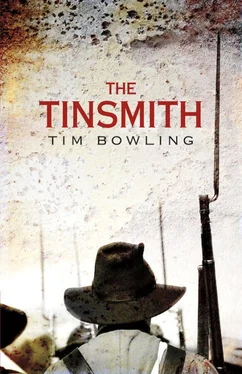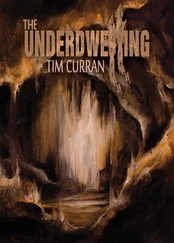What woke him, he did not know. But something drew him to the window and made him witness to a strange scene. On the wharf, in full morning light, the Lansdowne brothers stood profiled, face to face. Henry Lansdowne suddenly waved one arm dismissively, in a pushing away gesture that caused Thomas to lift his arm as if to fend off a blow. The older man, with surprising speed, turned and pointed at the house. Anson flinched. It seemed he was seeing something that should not have been conducted anywhere but behind closed doors. The fire of Henry Lansdowne’s distorted visage, however, might have burned away all privacy. Thomas Lansdowne appeared to step back from it, scorched.
Then he shook his head roughly and, at last, sagged in all his joints. With desperation he reached out and grabbed his brother on both shoulders. But Henry swept his arms away. He seemed to loom even larger above Thomas before finally striding off in the direction of the cannery.
For a few seconds, Thomas did not move. Anson realized what news the man had just received, and he pitied him. If he had been away from home for some inessential reason, he was still not to blame: illness can come on very suddenly, and he was obviously the sort of father who would rather die than be absent when his child was in danger. But the tension had been building around the Lansdownes ever since Anson’s arrival. Perhaps the child’s condition had brought matters to a climax. Something final certainly seemed to attend the motionless figure on the wharf.
Then, as if shot, Thomas Lansdowne dropped to his knees. He flung his head back, his posture like that of a wolf about to howl.
Anson couldn’t stop himself. He opened the window, as though to admit the man’s pain, but only the dull, relentless pulse of the tin press disturbed the silence.
At last, Thomas Lansdowne got to his feet and, like a blinded bull, lumbered down the gangway and into the yard. In a moment, Anson knew, he’d be wild at the girl’s bedside, feverish with questions.
Turning exhausted from the window, Anson braced himself for the charge.
July 1881, the mouth of the Fraser River
All day he had felt the salmon coming, sure as nightfall. He stood, his long legs braced, in a flat-bottomed skiff in the middle of the broad, silty river and gazed toward the ocean. Out there, by the millions, the salmon waited, hanging like ripe fruit in the salt depths, ready to make their last fierce rush to the spawning grounds far inland. The brinish air trembled with the weight of the fish’s will, the sun burned yellow-white as it crept between the horizons, and Dare often had to raise one of his muscle-knotted forearms to his eyes to wipe away the sweat. All around him the delta of sloughs, sandbars, and marshes held its breath; the tall reeds and grasses close to where the river met the ocean shivered slightly, like the fine filaments beneath the gills of the salmon, and, behind him, along both banks, the serried rows of great firs and cedars silently pulled in their shadows as if they did not want to contribute their black nets to the harvest that would soon follow.
Dare knew he had done all he could. He had gone to Victoria and secured another crew of Chinese. He had readied the cannery for the great run of salmon that would soon begin. But the forces against him were strong, and he knew that his time in this place was ending. Even knowing that the doctor had come was just a beginning in the next part of his own journey, just as Orlett’s death had been an ending and a beginning as well. As everything was an ending and a beginning.
Dare looked at his forearms, already browned from the sun, and wondered at the blood flowing in the veins. That wonder had mostly gone, driven under by labour, by the ceaseless chase for fortune. But it could still surface, like whaleback on a calm sea, to shatter whatever peace his mind and spirit had found. Orlett’s desperate lie—“You’re white, boy, you’re not a nigger”—and the relentless pounding of the hooves of the mulatto’s horse mostly resided under his blood, but the world would not be still, it would not let the lie and the hoof beats fall completely silent. Dare had to take care of that himself.
The sun bloodied and the dusk fell and the first wave of fish struck the corklines of the linen nets spread across the rivermouth. The tide was approaching slack. Dare slipped the oars and let the skiff settle. He glanced at his shotgun resting in the thwarts and then stared downriver for the Englishman. They were still some distance apart, more than a hundred fathoms, but Dare knew Thomas Lansdowne by his barrel shape and slouch hat. It had become a familiar sight over the years, the Englishman, with his shotgun at his chest, glaring across the sun-dazzle of water.
Dare waited. Eventually the Englishman would cross the boundary and would have to be driven off. Usually it was just his Indians who let their nets drift over the line, and they picked up and left at the first raising of a gun. Lately, however, the Englishman himself tested the limits. He did not go so far as to stay over the boundary when approached, but he patrolled it with his gun visible, protecting his skiffs as his Indians picked salmon from the nets. Salmon that didn’t belong to them. The Englishman grew bolder by the day.
Dusk was settling fast. The sun, like a gutted fish, spilled its crimson as it sank. Large flocks of fowl bruised the sky at the horizons. Dare watched them over the grey-white sails of his competitors’ skiffs—there must have been a hundred boats, a hundred dingy canvas sails catching the last of the breeze that had come up with the tide change. The birds rose and spread like black smoke above them.
He floated on the middle of the river, the banks miles off to either side. But the war and the doctor felt close, almost at his shoulder, whispering. The sky and river darkened. A salmon thrashed in a nearby net, pulling the tins on the corkline down. Three of his own skiffs formed a loose and drawing-in circle around him. One of the Indians softly chanted as he picked fish from the linen meshes. Brine hung heavy on the air. Dare breathed it in with the smell of the blood and slime of the catch. The chanting stopped, resumed; it was like the chanting the negro contrabands had done when they buried the dead.
Now the river turned black, the sky blue-black. The Englishman grew faint, but Dare knew he was there, waiting. All the skiffs on the river, all the dirty sails, were drifting to the one point. The fleets of the Scotsmen and the Swede and the other Americans. The workers of the men who wanted to drive him out. But there was time yet. He could sit still on his stretch of river, the stretch he had protected for seven years, and watch. And when he was forced to move, he wouldn’t hesitate; he would be smarter, quicker, stronger. Again.
Dare rubbed the soreness deeper into his eyes and watched the pilot star brighten far over the delta. As always, the night sky calmed his blood; how often he had relied on the stars’ loyal patterns when life seemed only a roiling confusion. Another salmon thrashed, its death throes deepening the briny flavour of the air. Dare tasted the salt; it sat heavily on his tongue. The water near him broke again, louder this time. He tried but he could not keep what was behind him from rising up in the echoes of the sound.
• • •
They’d travelled several miles a day, he remembered, in a general southwesterly direction, with their meagre clothes offering little protection from the cold. McElvane, though not as cruel as the overseer had been, was nonetheless a negro driver, and he drove them hard. That he was able to do so without resorting to violence or even threats was on account of his generosity to Daney; all the slaves realized that he had purchased her out of mercy in order to allow her to remain with her daughters. But they also knew that mercy was a fleeting quality in those who bought and sold them. The trader, they did not forget, viewed them as merchandise to be brought to market. No matter how often he let them rest or take a drink of water, he always remained the man driving them south.
Читать дальше












